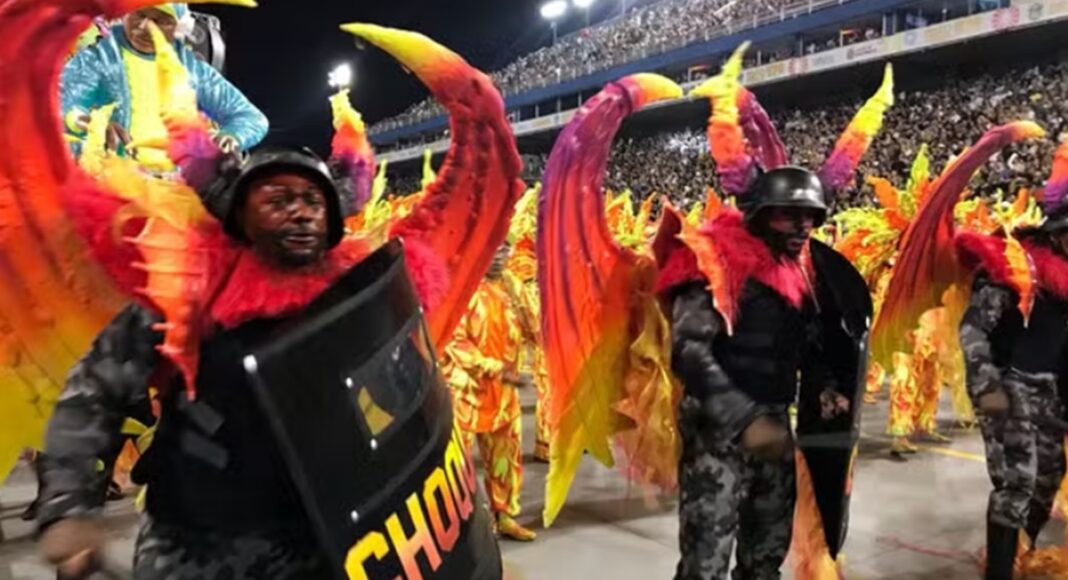The latest edition to Jan Rocha’s reporting from Brazil
The video shows a group of men sitting round a large table. At the head is ex-president, Jair Bolsonaro, and on either side there are government ministers including the finance minister, the head of the intelligence service, and army generals. You would assume they are discussing government plans for national security, or maybe for dealing with the climate or health emergencies.
But you would be wrong. This is July 2022, and they are discussing how and when to organise a coup. Should they do it before the elections, or after? Lula, the opposition candidate, is leading in the polls, he could even win in the first round. General Augusto Heleno, the head of Abin, the intelligence service, is impatient. He says Temos que virar a mesa antes, we must turn the tables before (the elections). He reveals that Abin is spying on the movements of Lula and Supreme Court judge Alexandre Morais, but Bolsonaro cuts him short and tells him to talk about this in private.
Bolsonaro urges them to question the electronic voting system, claiming it is open to fraud. Then if Lula wins, they can say the election was stolen, taking a leaf out of Donald Trump’s political playbook. Misinformation – that is, lies, about the electronic voting machines –should be spread. Bolsonaro himself will call a special meeting of foreign ambassadors in the presidential palace to cast doubts on the machines, even though every test has shown they are much more reliable than paper ballots.
Tempus Veritatis
The video was released by the federal police days after they carried out Operation Tempus Veritatis, arresting some of the intellectual mentors and organisers of the attempt, including army generals and presidential aides, and confiscating computers, mobile phones and documents from the homes of a dozen others. Bolsonaro’s passport was confiscated but he was not arrested. The police investigation is largely a result of the confession obtained from Bolsonaro’s aide de camp, Lt.Colonel Mauro Cid, who spent several months in police custody last year.
Lula won the election but the plot to overthrow the result continued. Bolsonaro never admitted his defeat, never accepted the result, never complimented Lula as is the custom in democracies, but he wasn’t just sulking inside the presidential palace, he was preparing for the coup. Instead of transmitting the presidential sash, he took off for Orlando to wait for the events to unfold in Brazil. Once the coup had succeeded he would return in triumph.
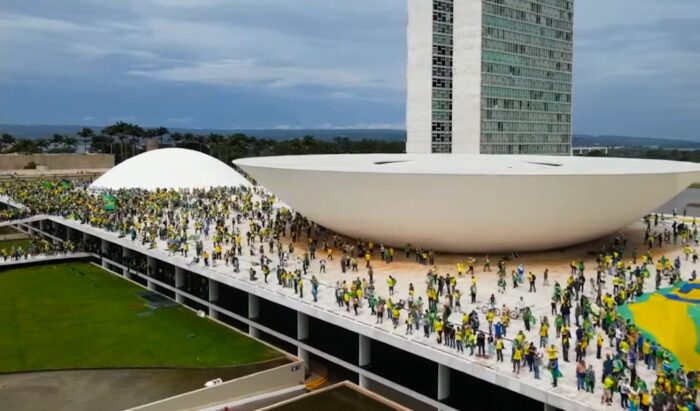
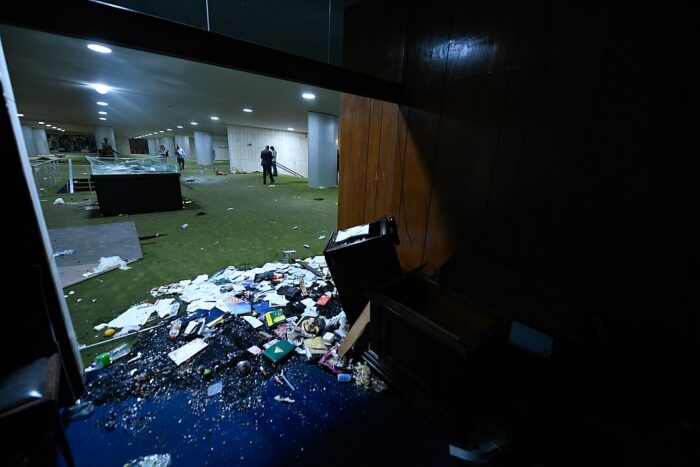
Thousands of Bolsonarista supporters had begun camping, unhindered, outside army barracks in different cities, waiting for the signal to attack. On 8 January they bussed in from all over the country to march on the Congress, the Supreme Court and the Presidential Palace, smashing and wrecking. When the new government finally re-established control and police moved in to arrest the rioters, there was a standoff between the police and the army. Two lines of uniformed men faced each other. The soldiers, who were protecting the encampments of Bolsonaro supporters, backed by tanks.
Lula, who was not in Brasilia, but visiting a zone hit by floods, resisted the calls to declare a military emergency which would have handed power to the generals. The army was divided between ‘legalistas’, who did not support the attempted coup, and Bolsonaristas, who did. Instead he suspended the governor of Brasilia who had failed to stop the rioters, and appointed an interventor.
Full details of what really happened in the feverish two months following Lula’s election in the second round are only now becoming known, as the federal police piece together events from the material they have seized. Whatsapp messages, phone calls, notes, even typewritten drafts of decrees to announce a state of siege, have all been found.
They have discovered that R$800,000 (US$160,000) was transferred to a US bank account on 22 December 2022, just before Bolsonaro abandoned the presidency and flew to Orlando.
Now there is speculation about if and when Bolsonaro, the instigator and main beneficiary of the coup plot, will be arrested. He has called a street rally for 25 February in São Paulo in an attempt to show he is still a popular figure with mass support.
Carnival reality
During the four days of Carnaval fantasy, or wishful thinking, take the place of reality in Brazil. This year however, reality intruded, becoming the subject of many of the samba schools’ enredos, or theme songs.
Police violence, which has claimed a growing number of victims – including small children – in Brazil’s favelas, was portrayed. In Sao Paulo samba school Vai-Vai’s performance, dancers dressed as riot police with horns on their helmets and red and orange wings, in a clear allusion to demons. This provoked an indignant note of protest from a police association.
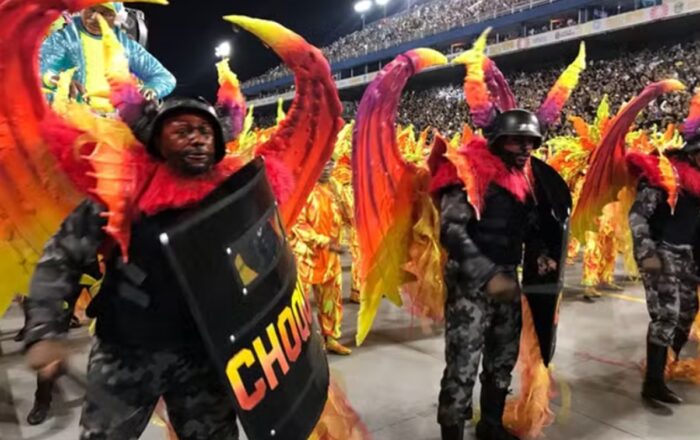
Rio samba school Portela’s theme was inspired by the book Defeito de Cor (Defect of Colour) by Ana Maria Gonçalves. This tells the story of Luísa Mahin, who travelled from Dahomey to Brazil in the 1800s in search of her enslaved son, Luís Gama, who later became a lawyer and leading abolitionist. The search of Black mothers for justice was made real with the presence of 16 mothers who have lost their children to violence, among them Marinete Silva, the mother of murdered Rio councillor Marielle Franco.
Samba Portela. Carnaval 2024. Video: Rio Carnaval
Academicos do Salgueiro chose the fight of the Yanomami to maintain not only their land, threatened by illegal goldmining, but their centuries of wisdom and communion with nature. Called “Hutukara”, their theme tune stated: ‘We don’t want your order or your progress’.
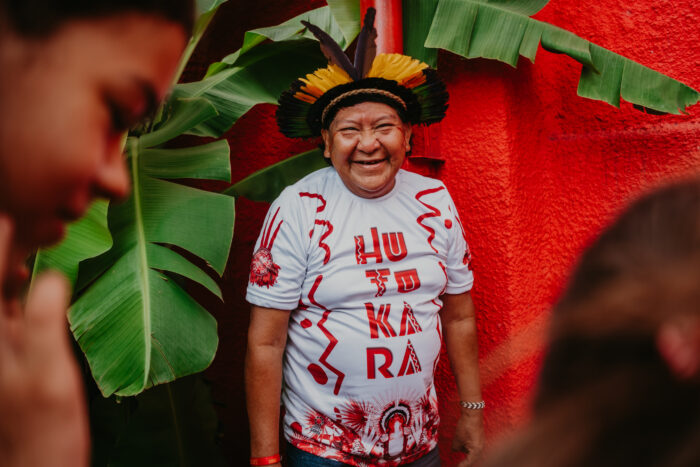
Davi Kopenawa led a group of 12 Yanomami who took part in the display in the Rio Sambodromo. ‘Our fight is to protect the soul of the Amazon forest, Black and Indigenous people together’, said Davi. Bruno Pereira and Dom Philips, murdered last year, were also commemorated in the wing representing the xapiris, the spirits of the forest.
Once again, the amazing organisational capacity of the Black communities, with thousands singing and dancing in elaborate and creative costumes, large bands of perfectly synchronised drummers and huge floats lit by multicoloured strobe lights, was on display. Unlike the samba schools’ successful organisation of carnival blending music, dance and political messages, that of the coup plotters failed.
Salgueiro 2024 – Hutukara – Emerson Dias e Carro de Som do Salgueiro. Video: Salgueiro TV 2024

